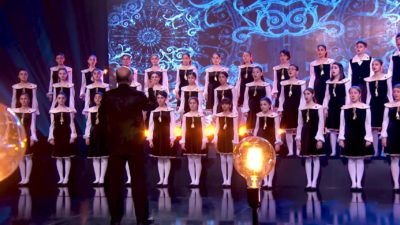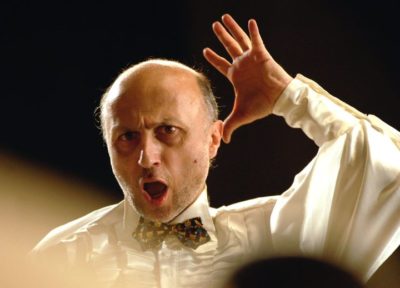
The Little Singers of Armenia
Gold Medals for the Little Singers of Armenia
By Muriel Mirak-Weissbach
YEREVAN/VIENNA, AUGUST 12, 2021— All eyes this summer were on the Olympic games, where Armenia competed successfully in several disciplines. Some weeks earlier, another international event took place, albeit not followed by so many millions of television viewers, but in which the Armenian contestants walked away with gold, and not only once. The venue was Vienna (this year, due to pandemic conditions, the contest was online), and the discipline, music. It was an event with competition, but dedicated to the spirit of cooperation, mutual development and peace.
The World Peace Choral Festival is indeed a special kind of festival, which brings together choirs, both young and adult, in musical education and performance. The aim is to provide participants the opportunity to engage in workshops led by world-class musicians, thus developing their own talents, and to broaden their cultural understanding through exchange with choirs of many other nations. They also engage in competition, though that is not the ultimate or central focus of the initiative. This year, top awards went to the Little Singers of Armenia and their founder Tigran Hekekyan.
Hekekyan received the Outstanding Conductor Award, and the Little Singers got the Gold Medal and the First Prize of Grand Prix, recognized as the best and absolute winner among the choirs that won the Grand Prix in different nominations in the second round. Other choirs from Armenia also won high recognition. The Geghard Vocal Ensemble earned a Gold Medal and Grand Prix in the category of vocal ensembles, under the direction of Anahit Papayan, who received an Excellent Choir Conductor award. Sona Hovhannisyan was honored with the same prize with the Hover Chamber Choir which won a Gold Medal in the mixed adult choir group. And the Arar Choir, conducted by Gor Melqumyan, won a Gold Medal in the Female Choir competition. The jury consists of world-famous musicians and music educators who judge contestants in 11 categories. The 14 choirs who won 1st place in their categories were selected to enter competition for the Grand Prix; winners of the Grand Prix receive €3,000 for first place, €2,000 for second and €1,000 for third.
Armenia’s Cultural Ambassadors
The Little Singers of Armenia are often referred to as the cultural ambassadors for the country, and that is not only metaphorical. In 2001, Tigran Hekekyan was nominated Cultural Ambassador of Europe by the European Federation of Choirs. Hekekyan, artistic director and conductor of the choir, founded it in 1992. He is president of the Armenian Little Singers International Association as well. Over the past three decades, the young singers have performed in Europe, North America, Asia and Africa, presenting a vast repertoire in many languages, with technical and artistic excellence. Hekekyan has twice received honors from the President of Armenia, the medal of Movses Khorenatsi in 1996 and the honorary title of Prominent Educator in 2010. He has served as a jury member in international competitions and has lectured on the art of Armenian choral music. In addition, he and the ALS International Association have organized and directed music festivals, among them Ashtarak (1993), Yerevan (1996), United by Song (2000), Singing Armenia (from 2001), the Song of Unity (2004, 2006), and the Komitas Festival 2017. They have assisted numerous choruses in Armenia, including in schools. (See https://www.als.am/en)

Tigran Hekekyan
Music Capital Vienna
Given its prominent role in the history of music, it comes as no surprise that Vienna should host such an international endeavor. The World Peace Choral Festival is supported by Austria’s federal government authorities, the Vienna city government, the Vienna Boys Choir, the United Nations headquarters in the city, several non-governmental organization, enterprises and public figures.
In addition to Austria, participants over the past years have come from all over the world, from western and eastern European nations, Asia, the Middle East, Africa, Australia and the Americas. This year, the 11th anniversary of the festival, over 340 choirs from 55 countries participated online. They came from Armenia, Argentina, Austria, Australia, Belgium, Brazil, Bulgaria, Canada, Czech Republic, Croatia, Chile, China (Mainland, Hong Kong, Taiwan, Macau), Denmark, Estonia, Egypt, Finland, France, Germany, Georgia, Greece, Hungary, Italy, Indonesia, Israel, India, Kenya, Kosovo, Lithuania, Latvia, Mauritius, Macedonia, Malta, Moldova, Mexico, Norway, Philippines, Poland, Portugal, Romania, Russia, Slovenia, Spain, Syria, Serbia, Sweden, South Africa, Switzerland, Spska, Turkey, Tanzania, Ukraine, Uganda, United States, United Kingdom and Vietnam.
The certificate presented to winners of these medals bears the following message: “Coming together to sing, singing for a better future! Peace is the most important theme of our mankind, and music is the bridge connecting people’s hearts. The World Peace Choral Festival is the world’s first choral event with peace as the theme. It is committed to promoting the development of world peace and provides a platform for communication, exchange, understanding and friendship to people who love singing and peace from all over the world.” The organizers conclude with congratulations to the winners for making their positive contributions to world peace. One very concrete contribution came in the form of five concerts, held to raise funds for UNICEF. Among the choirs performing were the Ponomarev VESNA Children’s Choir from Moscow, Only Boys Aloud from Wales, The Kenyan Boys Choir and Paris Boys Choir, and the COLOR MUSIC Children’s Choir from Ukraine.
Learning from the Masters
Although a highlight of the festival is the presentation of awards, the focus during the 22-day process is on education, exemplified by the online master classes and workshops. These sessions dealt with theoretical, historical and very practical aspects of choral activity. This year, for example, Dr. Zimfira Poloz, musician and faculty member of the University of Toronto, led a master class on vocal pedagogy and voice as an instrument. The president of the Artistic Committee of the WPCF, Prof. Gerald Wirth, who is also president and artistic director of the Vienna Boys Choir, taught a class on breathing control as well as finding one’s pitch and voice. A session by Prof. Simon Carrington of the UK, professor of conducting at Westminster Choir College USA, and Yale, focused on the close analysis of two songs. Dr. Andrea Angelini, who presides over the Emilia-Romagna Regional Association of Choirs, addressed Italy’s path in the development of music, from the golden Renaissance to opera. Professor Stephen Darlington from the UK, explored how English cathedral choirs function, and introduced participants to lesser known repertoires from the early 16th century. Darlington is Honorary Member of the Royal Academy of Music and Honorary Canon of Christ Church Cathedral, Oxford.
To see a performance by the Little Singers of Armenia, visit https://www.facebook.com/worldpeacechoralfestival/